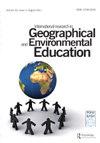A model of lived experiences and geographical consciousness based on Namibian secondary school learners’ perspectives
IF 3.1
Q2 EDUCATION & EDUCATIONAL RESEARCH
International Research in Geographical and Environmental Education
Pub Date : 2023-04-22
DOI:10.1080/10382046.2023.2201757
引用次数: 1
Abstract
Abstract Teachers in Namibian government schools have to cope with a lack of textbooks and must teach content-rich subjects, specifically geography, with limited resources. The literature makes it clear that fieldwork and outdoor learning play essential roles in understanding and conceptualising geography. The challenge is that such beneficial and planned fieldwork opportunities are neither accessible to all learners nor equally distributed within Namibian schools. Most Namibian learners do, however, have many lived experiences outside school and they are exposed to a wide range of different everyday contexts and environments to varying degrees. Unfortunately, everyday lived experiences are not always recognised as potential and relevant geographical resources for teaching and learning. The research involved 28 learners from five Namibian secondary schools. Open-ended, in-depth, semi-structured individual interviews were conducted and participants were asked to make a drawing illustrating how they experience geography in their daily lives. Based on the themes which were identified from the interpretative phenomenological analysis, we critically discuss how lived experiences can influence geographical consciousness. To conclude, we propose a model of the relationship between lived experiences and geographical consciousness, as well as the barriers and enablers at play.基于纳米比亚中学学习者视角的生活经验与地理意识模型
本文章由计算机程序翻译,如有差异,请以英文原文为准。
求助全文
约1分钟内获得全文
求助全文
来源期刊

International Research in Geographical and Environmental Education
EDUCATION & EDUCATIONAL RESEARCH-
CiteScore
5.20
自引率
33.30%
发文量
11
期刊介绍:
International Research in Geographical & Environmental Education publishes quality research studies within the context of geographical and environmental education. The journal endeavours to promote international interest and dissemination of research in the field, provides a forum for critique, and demonstrates the relevance of research studies to good professional practice.
 求助内容:
求助内容: 应助结果提醒方式:
应助结果提醒方式:


